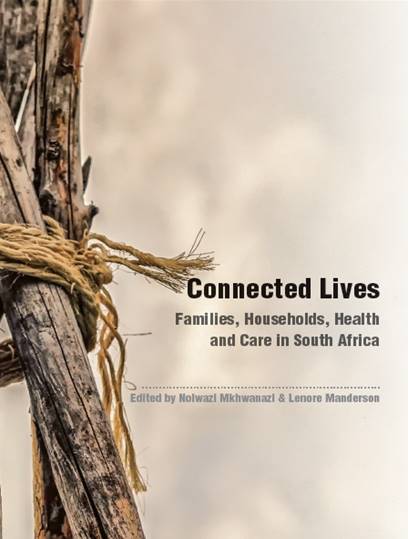Connected
Lives
Families, households,
health and care
in contemporary South Africa
Edited by
Nolwazi Mkhwanazi
& Lenore Manderson
Paperback
The
Book
Connected lives: Families, households, health and care in contemporary South Africa, illustrates the changing constitution and the variability of households, fluid understandings of family, and the impact of these in the context of life changes and health problems. Through 29 case studies of people of diverse backgrounds in terms of ethnicity, class, sex and gender, of varying ages and from both urban and rural backgrounds, the authors explore the household as a site for the production of health and care. The book illustrates the impact of economic, demographic and social changes on households and families, and considers how these factors influence everyday life, health, wellbeing and care in contemporary South Africa. This book will interest those in global public health, anthropology, and population and demography studies.
The
Authors

Nolwazi Mkhwanazi has a PhD in Social Anthropology from the University of Cambridge (2005), working on early childbearing to examine gender and generational relationships in a South African urban township. She is Senior Lecturer in Anthropology at the University of the Witwatersrand, and presently a senior researcher and director of the Medical Humanities programme at WISER (Wits Institute for Social and Economic Research). Her research interests revolve around youth, gender and reproductive health issues. She is co-editor, with Deevia Bhana, of Young Families: Gender, Sexuality and Care (2017).
Lenore Manderson is Distinguished Professor of Public Health and Medical Anthropology in the School of Public Health at Wits, with affiliations with Brown and Monash Universities. Her research and publications focus on chronic and infectious disease and social circumstance, with attention to how access to technology unequally interacts and impacts on chronic conditions. She also works on questions of climate change, adaptation and advocacy. She edits the journal Medical Anthropology, and is founding editor of a monograph series, Medical Anthropology: Health, Inequality and Social Justice (Rutgers University Press).
Table of
Contents
Preface
Acknowledgements
Chapter 1. FAMILY STRUCTURES AND EVERYDAY RELATIONSHIPS OF CARE
Lenore Manderson and Nolwazi Mkhwanazi
Chapter 2. MAKING FAMILIES
Nolwazi Mkhwanazi and Lenore Manderson
Case Study 2.1 The complexity of care in young families
Nolwazi Mkhwanazi
Case Study 2.2 ‘Too old to start a family?’
Ziyanda Majombozi
Case Study 2.3 Families, emergency and birth progress after apartheid
Kathleen Lorne McDougall
Case Study 2.4 Birthing Lessy
Cheyenne Jordaan
Case Study 2.5 Single in Soweto
Langelihle Mlotshwa and Sonja Merten
Case Study 2.6 Beautiful blessings
Casey Golomski and Gabby Dlamini
Chapter 3. FAMILY KEEPING
Nolwazi Mkhwanazi and Lenore Manderson
Case Study 3.1 Being a good mother
Sara Jewett Nieuwoudt
Case Study 3.2 “I don’t want friends…I have family”
Nirvana Pillay
Case Study 3.3 Disconnected
Deidre Blackie
Case Study 3.4 “I did well for my family”
Susann Huschke
Case Study 3.5 Tender blessing care
Lebohang Masango
Chapter 4: HOW MEN CARE
Lenore Manderson and Nolwazi Mkhwanazi
Case Study 4.1 Sandile’s story
Nozipho Mvune and Deevia Bhana
Case Study 4.2 Saving face
Alison Swartz
Case Study 4.3 The grants shopping basket
Rebecca Hodes
Case Study 4.4 On being a father
Mzikazi Nduna and Welmari Bouwer
Case Study 4.5 Responsible masculinity
Edmond Madhuha and Lorena Núñez Carrasco
Case Study 4.6 Hitting out
Ruari-Santiago McBride and Mzwakhe Khumalo
Chapter 5: EVERYDAY CARE AND ILLNESS
Lenore Manderson and Nolwazi Mkhwanazi
Case Study 5.1 The whistling of rats
Susan Levine, Alison Swartz and Hanna-Andrea Rother
Case Study 5.2 Sihleng’imizi
Tessa Hochfeld, Jenita Chiba and Leila Patel
Case Study 5.3 The misclosure of an adolescent’s HIV status
Rebecca Hodes, Beth Vale and Elona Toska
Case Study 5.4 Catching women before they fall out the world
Anna Versfeld
Case Study 5.5 A family affair
Lario Viljoen, Hanlie Myburgh and Lindsey Reynolds on behalf of the HPTN 071 (PopART) team
Case Study 5.6 Blood ties
Emily Avera
Chapter 6: AS FAMILIES AGE
Lenore Manderson and Nolwazi Mkhwanazi
Case Study 6.1 Healthy aging
Monde Makiwane, Ntombizonke A. Gumede and Mzolisi Makiwane
Case Study 6.2 Caring, communities and poverty
Lenore Manderson
Case Study 6.3 Nomabali’s Story
Stine Hellum Braathen and Leslie Swartz
Case Study 6.4 Death and migrant communities of care
Linda Musariri and Eileen Moyer
Case Study 6.5 “Suffering grannies”
Jessica Ruthven
Case Study 6.6 Caring for the dead
Lorena Núñez Carrasco
Chapter 7. FAMILIES, CARE AND SUPPORT
Nolwazi Mkhwanazi and Lenore Manderson
References
About the authors
Index

